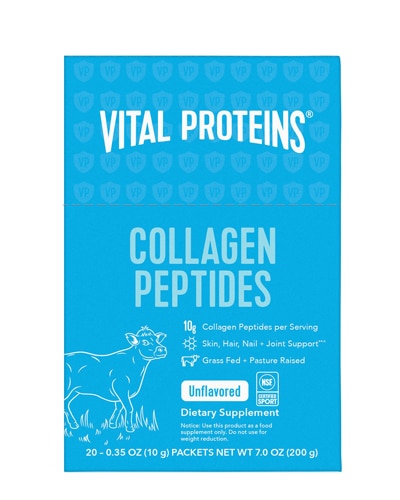Do you like cream and sugar with your coffee? How about a little collagen? Adding collagen powder to a cup of joe is the latest twist in a fad that has people gulping down the supplement to improve their health.
What is collagen?
Collagen is the top protein in the human body. True believers say consuming collagen in supplement form can help repair and strengthen bones, muscles, skin and tendons.†
Proponents also cite other benefits of consuming collagen, such as alleviating gastrointestinal discomfort and strengthening joints.†
Collagen supplements typically are derived from connective tissue in cows, or from fish. News reports say actress Jennifer Anniston and entrepreneur Dave Asprey are among those sipping down collagen powder with their morning java.
Of course, belief in the powers of collagen is nothing new. The protein is found in wrinkle creams, and a recent trend saw people consuming "bone broth" as a means of ingesting collagen's hoped-for benefits.
But before you rush out to buy these products, do they deliver the promised results?
Collagen claims – and reality
Many people take collagen to prevent wrinkles, or to repair already existing skin damage. Thus far, it's unclear how effective collagen supplements are in boosting skin health, says Dr. Patricia Farris, a dermatologist and clinical associate professor at Tulane University School of Medicine.
"There some studies that have shown positive skin benefits from supplements that contain collagen hydrolysates, and these studies are promising," she says. "But we still have a lot learn."
Dr. Janiene Luke, a dermatologist and associate residency program director in the Department of Dermatology at Loma Linda University, agrees that research is offering hints about the possible benefits of supplementation.
"There is some evidence of wrinkle reduction, increased hydration and smoothing of the skin after supplement use," she says.†
But she also cautions that more research needs to be done, and warns people that supplements typically are not regulated by the Food and Drug Administration.
Collagen supplements also are being used as a means of calming gastrointestinal distress, and soothing joint pain.† But experts say that here, too, more research needs to be done.
Collagen conclusions
For now, it appears that while collagen supplementation might offer some benefits, many questions remain.
"We need more objective studies on currently available supplements in order to reassure our patients that these products are both safe and effective," Farris says.
In the meantime, there are other steps you can take to get the benefits promised by collagen proponents.
For example, you can minimize wrinkles in the skin by limiting exposure to the sun and not smoking. Luke says reducing sugar intake and eating the right fats also might help your skin.
"Most research suggests that including foods that have high amounts of healthy fats and antioxidants -- and are low in refined carbohydrates and unhealthy fats -- may promote healthier looking skin," she says.
†These statements have not been approved by the Food and Drug Administration. These products are not intended to diagnose, treat, cure or prevent disease.





